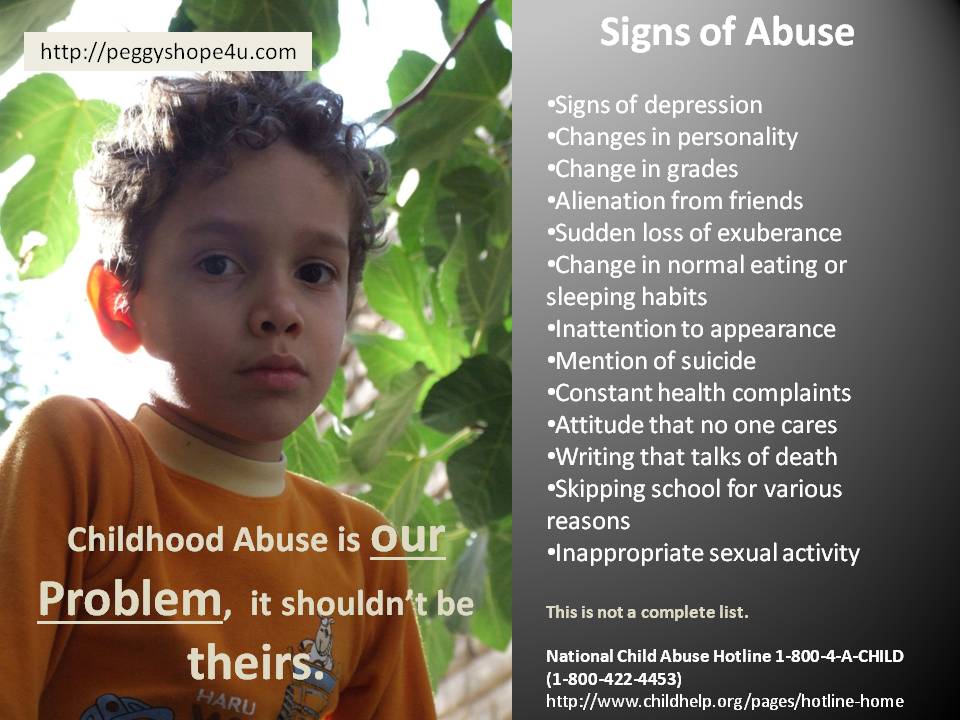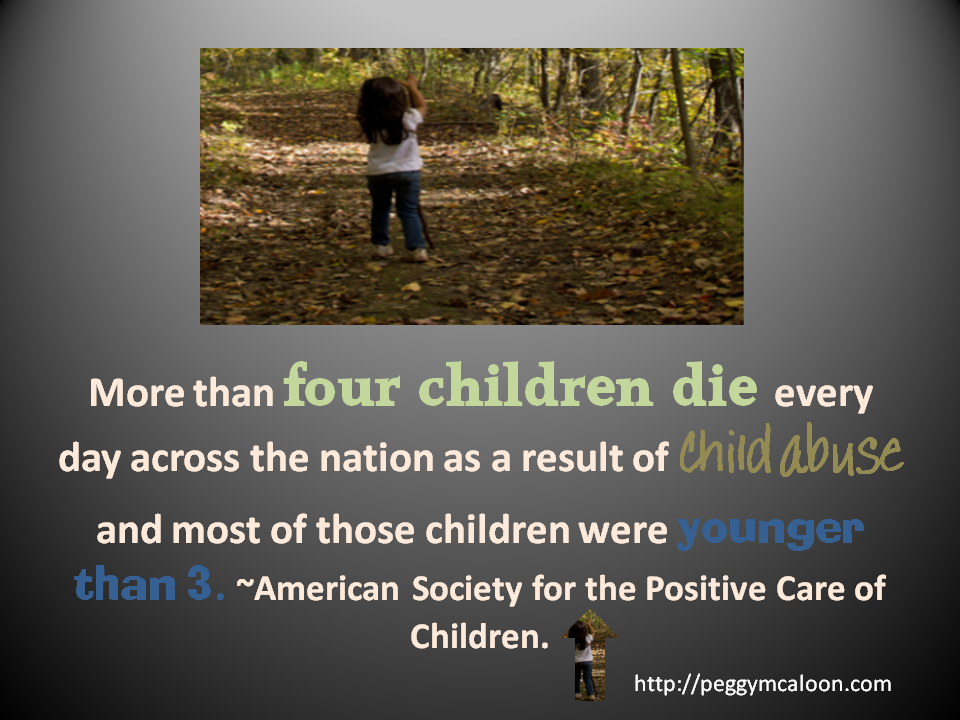Readers speak out about the Long-term Effects of Child Abuse:
In 2015, Children’s Advocacy Centers around the country served more than 300,000 child victims of abuse. We don’t have the statistics for 2016 yet, but the consequences of abuse can affect the victim for a lifetime. In certain cases, the results of abuse surface for generations. The long-term effects of child abuse are a large part of the private conversations I’ve had with many readers. It’s heartbreaking to learn that only ten percent of the abusers are not known to the children as was the case for Jacob Wetterling who finally came home to his parents recently.
Thirty-nine percent of the abusers are the parents, and a whopping fifty-one percent are family members. Most of the men and women contacted suffered abuse from a family member. Seventy-seven percent of the time, the abuser is over the age of eighteen when the injustice occurs. I am in the thirty-nine percent, my horror began at age seven.
What are the long-term effects of child abuse? You can’t imagine the terrors we feel if you haven’t been a victim yourself. Far too many of my health problems as an adult have been linked to the damage done to me as a child.
One thing is abundantly clear; we must understand that no one is above suspicion when it comes to the safety of our children
Difficulty Developing Personal Attachments
 “Why do you love me? No one should love me!”
“Why do you love me? No one should love me!”
This heart-breaking comment came from my adopted grandchild last summer.
Our beautiful and intelligent child suffered neglect and abuse. My heart broke with his words because I understand how a child can feel lost and unloveable.
How many times did I try to push people away because I felt inferior? I believed everyone was better than me.
When the abuser is your parent, you never really feel you deserve anyone’s love. The most important person in your young life hurts you, and you quickly learn your feelings don’t matter.
After my recent surgery, I couldn’t believe the number of times my husband checked on me in the middle of the night when he thought I was sleeping.
He needed to make certain my legs were positioned appropriately after the hip surgery. I didn’t ask him to do this. He did it on his own because he loves me that much. For someone like me, the realization that I’m loved so deeply is difficult to accept.
Some nights I pondered for hours how anyone could care for me to that degree and be so vigilant.
I know my husband loves me; he tells me all the time how much. And yet, I’m stunned by the depth of his love. There was never really a time in my life when I believed I deserved anyone’s love.
How do you convince a child to love and trust when they’ve lived in terror for so many years?
2. Chronic Illness
“I was sick all the time when I was a child following the sexual abuse. Each day, I lived in fear of my  grandfather’s visits.” ~ anonymous quote
grandfather’s visits.” ~ anonymous quote
This comment brought back memories of all the chronic illnesses I suffered as a child, starting with Rheumatic Fever. Recently, I was part of a national study on auto-immune diseases as the researchers tried to link the condition to childhood sexual abuse. We tend to ignore that health problems are one of the most serious of the long-term effects of child abuse.
The National Survey of Child and Adolescent Well-Being (NSCAW) did a study which documented nearly twenty-eight percent of children who suffered maltreatment suffered from a chronic health condition within three years following the investigation. (Administration for Children and Families, Office of Planning, Research and Evaluation [ACF/OPRE], 2007.) The study I was involved in attempted to follow this trend into adulthood.
3. Impaired Brain Development
“My mother shook me hard when I was a baby because I had colic and cried all the time. I have trouble concentrating.” ~anonymous quote
 A study by the Centers for Disease Control and Prevention (CDC) showed that one in four children suffering from shaken-baby syndrome dies, and nearly all suffered from a chronic health condition. The long-term effects of child abuse can be crippling for those involved.
A study by the Centers for Disease Control and Prevention (CDC) showed that one in four children suffering from shaken-baby syndrome dies, and nearly all suffered from a chronic health condition. The long-term effects of child abuse can be crippling for those involved.
It’s not just the immune system that becomes compromised through childhood maltreatment. Brain function doesn’t develop like it normally does after abuse occurs. Trauma interrupts the process of a child’s brain development.
It’s critical for me to read information ten to twelve times before I retain it. I remember how much I envied my brother and my college roommate. They could read something once and go to bed.
I sat up until three or four in the morning before a test to try to repeat the information in my head enough times to get me through the test.
My ability to memorize became an even larger problem after the car accident and brain injury in 1978.
I have a tendency to use a word repeatedly in my writing or use the same word to begin multiple sentences in a row. It takes me three times longer to write a post than someone who doesn’t have these impairments.
Supporting Brain Development in Traumatized Children and Youth
4. Thoughts of Suicide
“I tried unsuccessfully to end my life when I was in college.” ~anonymous quote
This comment broke my heart. I know what it’s like to be a young person so devastated by the abuse that you believe you don’t belong in this world. Wanting to commit suicide is definitely one of the most serious of the long-term effects of child abuse.
in this world. Wanting to commit suicide is definitely one of the most serious of the long-term effects of child abuse.
The belief that you’ll never measure up hit me the hardest when I was Miss Washington County. I went to a summer Girl Scout Camp to sing songs and tell stories around the campfire with the little girls.
My local pageant committee suggested I wear my crown that night because the girls would expect it. I watched the little faces looking up at me with such longing. Each of those beautiful little girls wanted to be a princess like me.
I did a perfect program, including a ‘sing along.’ And yet, inside my head, I screamed at those little girls: “No, you don’t ever want to be like me!”
It’s easy for you to end your life when you’re broken and too terrified to tell anyone your story.
I read somewhere that over 50% of the successful suicides in adult women were in women who suffered physical or sexual abuse as children. The scars can be covered up, but they can’t be forgotten, no matter what anyone tells you.
5. Difficulty With Anger
 “I, well, I was abused by my coach. Until today, I’ve never told anyone about this. Sometimes I get so angry, and can’t control it.” ~anonymous quote
“I, well, I was abused by my coach. Until today, I’ve never told anyone about this. Sometimes I get so angry, and can’t control it.” ~anonymous quote
As I typed these words spoken by a male reader, I immediately thought of Helen Reddy‘s song, “I am Woman, Hear Me Roar!” Her song exemplifies how I feel today. No one will ever hold me back or abuse me again.
How does a grown man deal with the remnants of the long-term child abuse he suffered at the hands of his Priest, Coach, or Cub Scout Leader when he was a child? Is he capable of fighting his way beyond the demon sixty years later?
Children are defenseless. It doesn’t matter whether we are male or female, the scars penetrate our very core. Men especially take out their frustrations with a form of anger. These automatic reactions aren’t the type of outburst we can control.
This anger spills out when we don’t want it to, but there’s little we can do about it.
We only recognize it when the man kicks the dog or gives his son a backhand that propels him across the room.
I haven’t read any statistics on this. And yet, I do believe some people react with anger to their childhood abuse and they have no ability to control it. If this is your problem, you need to get some immediate help with your issues before you cause any more harm to those you love.
6. Failed Attempts at Socialization
“I don’t do well with people. Perhaps, I never did. Maybe it has something to do with trust; I’m not sure.” ~anonymous quote from a reader
For abused and neglected children, socialization becomes problematic and is one of the major long-term effects of child abuse.
Younger children will act out some of the harsh realities of the treatment they received if another child challenges them or if they don’t like the direction given by an adult.
Unfortunately, many adults who have abuse in their background never gain the ability to interact appropriately with others. The simple solution for them is to avoid all contact.
Eventually, they experience failed marriages and broken friendships. Children of these individuals have difficulty forging relationships, too.
7. Risky Sexual Behavior
 “I was promiscuous when I was in high school and ended up with syphilis.” ~anonymous reader comment
“I was promiscuous when I was in high school and ended up with syphilis.” ~anonymous reader comment
Promiscuity is quite common for children who experience sexual assault. Once they reach puberty, they believe they need to be sexually active to be popular.
Much to the chagrin of the medical profession, these kids contract venereal diseases and pass them on to others.
Sexual exploration is one of the reasons parents need to enter into discussions of safe sex with their children. In my generation, the fear of Aids prevented many from sexual experimentation, but the current generation doesn’t have the same apprehension.
This incredibly important discussion may provide the first hints that something sinister is behind your child’s sullen behavior.
8. Drug and Alcohol Abuse
“I stole my mother’s oxycodone pills because it made the pain go away. For the first time, I was able to sleep and forget.” ~anonymous quote
Those who suffered from physical, emotional, or sexual abuse may end up taking drugs or alcohol to lessen the pain of isolation in their homes.
If you see these long-term effects of child abuse in yourself or your children, contact your doctor for some help in resolving the issues. Don’t become a victim of an overdose and protect your children from the same fate.
Our house was a first-rate prescription counter. Between Mom’s menopause, bi-polar disorder, and depression it was possible to find nearly full bottles of pills everywhere.
Instead of trying to get high, I chose to take the pills in an attempt to commit suicide when I was sixteen and couldn’t deal with the issues of puberty and my past abuse.
The angels were looking over me that day. I didn’t want to die. What I wanted was for someone to help me make it through the pain of life. That event triggered me to finally tell my mom’s best friend about my abuse.
We need to be open about why we feel so unworthy.
9. Secrets Are As Bad As The Abuse
 “I spent eighteen months in prison for beating my child after he wet his pants in public. My shame is that I ended up knocking out a tooth and breaking his arm.” ~anonymous quote
“I spent eighteen months in prison for beating my child after he wet his pants in public. My shame is that I ended up knocking out a tooth and breaking his arm.” ~anonymous quote
I wasn’t entirely sure how to respond to this admission. When I asked, the man told me his father beat him when he was growing up. He began to cry when he admitted his mother never stood up for him or tried to prevent it. It was something no one in the family was willing to discuss.
For those of us born after WWII, the one constant was the “dirty little secrets” the women whispered of when they thought their children and husbands weren’t listening.
We have to begin talking about the abuse. There will be no solution, and the consequences will continue to haunt the lives of countless children each year if we continue to refuse to talk about abuse, especially from family members. Open discussions are so much better than they were when I was little, but we still have a long way to go.
Unless we seek help to deal with the fallout of childhood abuse, we won’t be able to break the pattern and protect our children and grandchildren.
10. Costs to Society
The CDC did a study in 2012 that blew me away. They reported the total lifetime estimated financial cost associated with just one year of confirmed cases of child maltreatment (physical abuse, sexual abuse, psychological abuse, and neglect) is almost $124 billion.
We may not want to talk about the sexual abuse of children, but the CDC study showed the average lifetime cost for a victim was $210,000+. It’s possible to compare the costs to the lifetime cost of treating someone with type 2 diabetes which is between $159,000 and $253,000. Imagine how much money is being spent to care for victims year in and year out. This is something we could make dramatic advances in, if only we find the passion for protecting our children, instead of protecting the abusers
As I listen to the stories of those people who have read about my abuse, it’s impossible for me to fathom how any parent could ever hurt their child. I know it happens. It happened to me.
I watched my children and nieces and nephews as they grew, and there was nothing those children ever did to trigger the kind of abuse I suffered. It felt good to watch the little girls playing dress-up, and little boys emulating their sports heroes on the playground.
Our prisons are full of victims who never had a chance. We as a society are paying a horrible price for the atrocities performed against our children. The overall costs will never be able to be calculated because, for every person who has admitted their abuse, there is another who struggles daily in the fog of their deception. They became broken and live in fear of discovery.

